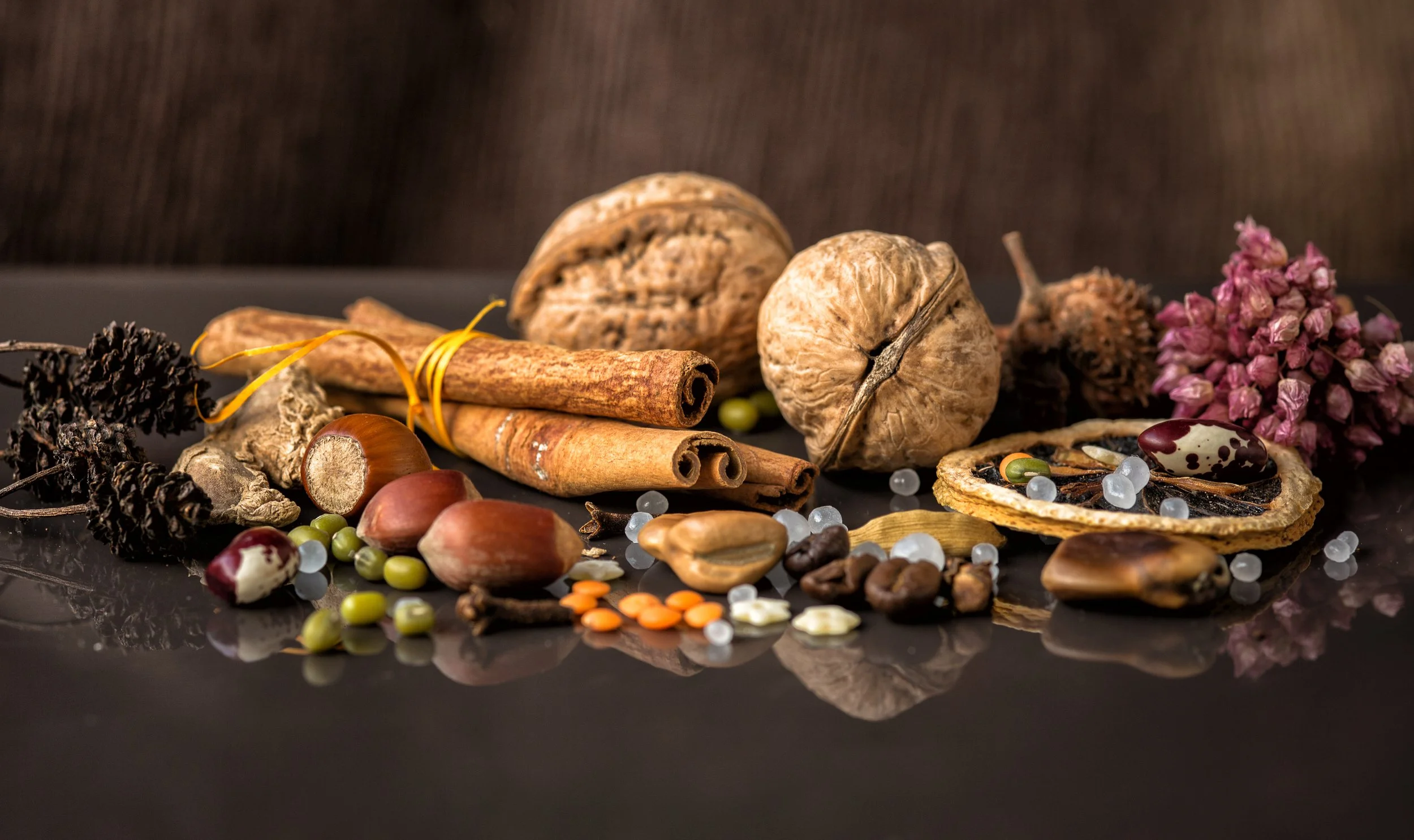Wintertime is the season of contemplation, solitude, and hibernation. In terms of energy, the winter season is an invitation to redirect our energies inwards. As the days grow shorter and the weather grows colder, we are invited to spend more time intentionally resting and nourishing ourselves.
As many of us live in cities and are surrounded by our technological comforts, it is easy to forget that we are an interconnected part of this vast world of nature. Our bodies, minds, and hearts crave living in harmony with the natural rhythms and cycles of the world we are a part of.
Seasons are vital to the health and growth of this planet; living in harmony with the seasons is just one way to connect to the wisdom of nature, our immediate surroundings, and ultimately, our inner selves.
This guide is an invitation to tune into the energies of the seasons, drawing on the wisdom of a few traditions: Shamanism, Chinese medicine, and Ayurveda. These traditions take into consideration the energetic climate of a season, and how we can live in harmony and optimal balance with those energies. In learning more about each season, we can align with the healing opportunities the season presents us and choose actions that support and fulfill us as we move through the year.
During winter, this means slowing down. Nourishing our bodies. Keeping warm and rested. Prioritizing contemplation, introspection, and meditation. Redirecting our energies inwards. All for the purpose of getting rest before the regeneration and growth opportunities of spring. With winter season symbolizing the closing of a cycle, and spring being about renewal and rebirth, take this time to do some contemplation about what has been and what is to come.
Tips for Winter Healing
#1 ALLOW YOURSELF TO REST AND HIBERNATE
In observing nature, we see that most living beings rest and hibernate during winter. If you find yourself feeling more tired and lethargic during this time, know that your body is simply responding to seasonal energies. Allow yourself to get more rest in winter. Your body is storing up energy for the more active and creative energies of springtime. Don’t overexert yourself if your body is wanting you to take it easy. You will end up depleting your qi and putting too much stress on your body if you push yourself too much. Instead, enjoy the quiet evenings and early bedtimes. Allow yourself to be introspective and use this time for reflection.
#2 EAT COOKED, SEASONAL FOODS
The Ayurvedic advice on foods to eat during winter is a nice transition from the fall, including the fall favorites of squashes, root vegetables, apples, and pears and the theme of eating warm foods, like soups and stews. During the winter months, our digestive fire is quite strong, and we need to be eating nourishing meals in order to maintain warmth and health. More foods to incorporate include: corn, carrots, brussel sprouts, kidney & black beans, walnuts, spinach & greens, mushrooms, grains (such as oats, quinoa, rice), and eggs. Ayurveda recommends cooking foods on low heat for longer periods of time and using less water than usual. Maintaining a regular routine for meal periods is important. Eating your largest meal for lunch is a helpful tip for digesting, because the sun is at its highest point in the sky which mirrors when our internal digestive fire is at its strongest.
#3
BALANCE
KAPHA
In Ayurveda, winter is recognized as a kapha season – cold weather, increased moisture (rain/snow), cloud covered days, and a sense of heaviness are all characteristic of kapha energy. Kapha is associated with the earth element and can lead to heaviness, lethargy, and sluggishness when out of balance. In the effort to balance the energies of winter, Ayurveda recommends inviting as much warmth into our life as possible. This can be physical or physiological, such as drinking hot tea and dressing warmly with scarves and socks. But this can also be emotional and mental, such as cultivating a light heart and inviting opportunities for fun and laughter. Further suggestions for keeping kapha in balance are to try and wake up at a later time than usual, when possible, and to shake off any sluggishness with some gentle stretches.
#4 KIDNEY CARE
In Chinese medicine, the organs include not only their physiological function, but also a mental, emotional, and spiritual function. The winter season is associated with the kidneys; the emotion associated with the kidneys is fear. Be kind to your kidneys during this winter season by keeping warm, especially your lower back area and your feet. Another way to take care of them is to eat certain foods which are beneficial to the kidneys, such as: black beans, walnuts, miso soup, seaweed, sesame seeds, ginger, and spices such as cinnamon.
#5 MIND
YOUR EMOTIONS
Slowness, cold, lack of sun, and isolation can lead to the emergence of lower frequency energies, such as fear or depression. In Western Medicine, Seasonal Affective Disorder (SAD) is a mood disorder characterized by depression/anxiety that occurs during the darker months due to lack of sunlight exposure. Adding a Vitamin D-3 supplement into your diet is a way to lighten low moods. Opening your curtains during sunlight hours or taking intentional, brisk walks at midday can also ease the sadness that tends to characterize winter.
#6 GET MODERATE, GENTLE EXERCISE
Our exercise and movement routines can also mirror the slowness of winter; workouts should be gentle in nature, so we are careful in not overdoing or overexerting ourselves. Moving our bodies is helpful for circulation, increasing the body’s warmth, and keeping a workout routine so that come spring it’s not as difficult to begin working out again. Walking is a great way to exercise and the intensity is something you can easily modify from intense to more gentle. Also since the weather is colder, your body has to work overtime to get warm, so you may burn 50% more calories than in summer, but it’s important to go a little slower until you get warm. Try doing an indoor sport, such as swimming at an indoor pool for a great cardio workout, instead of jogging outdoors. Doing light exercises such as tai qi or gentle yoga are also beneficial. If doing yoga, try doing poses that will help open the chest, throat, and sinuses, which will help remove congestion.
#7 BOOST YOUR IMMUNITY
With the change in temperatures, winter is a time when many people find themselves getting sick with a cold or flu. Boosting your immune system during the winter can keep you from catching seasonal sicknesses and increase your immune system’s fortitude year round. Getting regular sleep is always important, but even more so to help our bodies keep our immune system at their strongest. Make sure to wash your hands regularly, as this is one of the best ways to prevent the spread of infections. Try gargling with warm salt water – while this method is commonly used to soothe sore throats, it can also help in discouraging upper respiratory infections. You can even try drinking some warm green tea.
#8 KEEP HYDRATED
Staying hydrated is an important part of every season; during the wintertime, we can sometimes forget to reach for a glass of water if we don’t feel parched, as we tend to do in the summer months. Making sure you drink your daily 8 glasses of water a day will help to keep you appropriately hydrated. When drinking hot tea, opt for teas that are warming such as cinnamon tea or ginger tea. Cold and dry weather paired with indoor heaters can easily dry out skin – using a daily moisturizer is important to keep our largest organ (the skin!) soft and hydrated. If you notice your skin is still dry while using your regular moisturizer, you might want to look for a moisturizer specific to the cold weather seasons or for extra dry skin. Another option to keep moisture in the air is to get some green indoor plants. They soften the dry atmosphere by giving off moisture and oxygen, plus the colors will brighten up a dull day outside.
#9 NURTURE HEART CONNECTIONS
Winter is associated with slowing down and taking time to be at peace and still – a time for deep contemplation and looking inward to get clarity. Alone time is a healthy and important part of our self-growth and quest for self-knowledge. And while the season may call for times of solitude and reflection, there is also an invitation to balance alone time with quality time with loved ones. The sluggish, gloomy winter days may create feelings of sadness and loneliness that can be eased by spending time with heart-nurturing relationships. Sharing, listening, and supporting our friends and family can be a beautiful reminder of the reciprocity and balance found in relationships, the warmth that comes through sharing time with loved ones, and the importance of community during the hibernating, winter months.
#10 PRACTICE GRATITUDE AND MEDIATION
One of the simplest and most powerful practices in optimizing well-being is living in a state of gratitude. When we get sluggish, sad, or lonely, it’s important to open our minds and hearts to the abundance of blessings present in our lives. A great way of keeping this awareness is having a gratitude practice by taking a couple minutes each day to give thanks, either by writing or through reflection. Because winter is the season of rest and solitude, it is an especially rich time to spend in meditation. This can be through journaling exercises, guided meditations, or quiet time spent in contemplation. The stillness of winter is an invitation for us to redirect our energies inwards and introspect, in preparation for the blooming of springtime.
Below is a Wintertime Healing Energies Meditation to support you during this season. I hope the guided visualization will help you connect to the healing energies of the this beautiful season. May you experience deep relaxation and rejuvenation. If you have any friends or family who would enjoy these tips and this meditation, please spread the blessings and share it with them.
Big hugs and blessings to you,
Parminder











